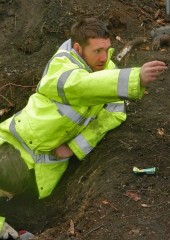Carrying on from last issue, we have more Masters course advice for you, from current students at York...
A Master's in Science: A Degree Worth Doing by Christina Cartaciano
As a former team member of the Post Hole, the editors asked me to write a little blurb about the MSc program I am currently on, as well as offer any advice I may have about taking on such a course. The MSc in Bioarchaeology is normally directed by Dr. Oliver Craig, but as he is currently on sabbatical, I get to enjoy academic supervision from Professor Matthew Collins, a man who is extremely enthusiastic and a human compendium of potential and published research in the field of bioarchaeology.
While I was completing my undergraduate degree in York last year, it seemed the logical step to stay on for a Masters course (indeed, it was the least problematic option when it came to considering how to organise, pack, and move three years' accumulation of random furniture, books, shoes, and clothes). On a more serious level, however, York is one of the few places in the U.K. to offer such a high-quality course with very well known, and well published, lecturers.
As any good student should, I asked all my postgraduate friends, who had either just handed in their Masters project or had graduated the year before, what the course was like. The overwhelming majority of them described it in one word: "intense". Little did I realize what exactly it was they meant by that description. "Intense". I think that is as accurately as I can convey to you the feeling of being a postgraduate. I remember the days of first year, when there was nary a care in the world... Or those in the second and third year, when I only had to concentrate, during any given term, on just one module and/or serious piece of writing (i.e. Independent Projects, Assessed Seminars, Dissertations). I think the best way to illustrate the intense sense of stress I have during term time is to tell you, the reader, to imagine the contents of your second- and third-year modules being squished into two terms, with deadline dates of two essays and a skills assessment report twice a term and the specter of that all important Masters project to sort out with your course director and relevant people.
And being the world's worst procrastinator that I am (and I do have a plaque hiding somewhere in bottom of my wardrobe), I struggled for the majority of first term to get myself motivated enough to do reading and writing in time. To be honest, I do not think that I have perfected the technique just yet, but I think I will have to give an update about my summative assessment deadlines in the next issue. But as I tell everyone that asks me what the program is like, I always mention in addition to the scary bits, that the degree is definitely worth the stress and the camp-outs in the library until closing time. Meeting the new people on my course, staying in touch with friends who have stayed and REALLY getting to know the subject area you are interested in, and finding people who are willing to guide you, that has definitely made it more than bearable. So if you are wondering, "Can I actually do a Masters?", provided you have the funding to do so, DO IT! You will be amazed at what you will learn.
MA Joy!!!! by Russell Almond
I have already done my undergraduate at the University of York. I knew York, the Department and some of the returning students really well. The reasons I chose for staying at York were that the department is great and the staff are really helpful and friendly to talk to...maybe tolerant in my case!
I decided to do an MA in Mesolithic studies, as this was a natural progression from the topics I chose to do during my undergraduate degree. You may have heard this a thousand and one times but yes, there is a lot of work to do. You have to be on the ball with the time management but also allow yourself to have time for fun. I am basically suggesting hitting the Willow every other night (I am sure you will discover this place) would not be a good idea; but relax and have fun with friends.
It is possible to have a job while doing an MA, but in my experience do not do more than two days a week of paid work as this heavily affected my studies and was not a pleasant experience. Some important advice I will give to you is be on the ball if self-funding! My funding experience was not problem-free and this caused a huge amount of stress, which again affected my experience during the first part of my Masters. Make sure that you are on top of what is being said to you and do not believe everything that you are told. Check. Double check! Then check some more. Make them know your name!
As I have said I am doing Mesolithic Studies and as other articles show, you will discover that whatever course you choose to do it will involve so much more. You will be able to choose many other topics aside from your core modules. For example, I chose to do a module in Artefacts; this brought artefacts to life, we were taught that they are not just material culture from the past but that they have their own stories allowing them to come alive! However, there is a lot of work to do in this year of study. You will feel under a lot pressure with the essays and presentations but also such a sense of accomplishment when you have produced the work that you will forget the worry you had for it.
You have to want to do an MA and you have to have picked the right place to study. York is a wonderful place to live in and an even better to place to study. The department is very supportive and more than willing to help out with any issues that may arise in your studies; I found my decision to study at York to be one of my best I have ever made. I am sure I have gone on a little too much so I better send this off. Besides, I have some reading to do on the interpretations of antlers in the Mesolithic before tomorrow...




